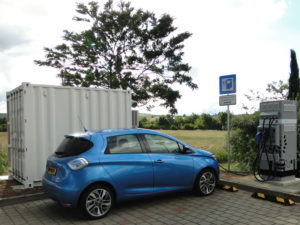Second-life batteries power charge points along Belgian and German highways
Connected Energy has installed two quick-charge stations along highways in Belgium and Germany that use second-life Renault electric vehicle batteries as power sources.

Second-life batteries power charge points along Belgian and German highways
E-STOR, developed by UK based Connected Energy, uses second-life batteries from Renault EVs to power a quick charge unit that is itself slow-charged by onsite solar PV, micro wind turbines or other low-power generators. The solution means quick charge units may be installed at locations where high power connections to the grid aren’t possible, reducing costs, the company says. E-STOR is planned to contribute to the development of a network of quick-charging stations in Europe.
Matthew Lumsden, Managing Director of Connected Energy, commented: “We are developing a range of E-STOR systems, some, like the two installed in Belgium and Germany are designed specifically to enable lower cost more sustainable electric vehicle charging. We are now talking to several parties about projects in the UK and Europe and look forward to wide scale roll out in coming months.”
Renault adds that electric vehicle batteries generally last eight to ten years in their first use, but have substantial capacity remaining for further use in stationary applications, from individual homes and multiple-unit residences to industrial sites. Furthermore, the batteries can then be recycled after their useful life has come to an end, Renault said.
Renault continued that they set up battery rental for electric vehicle customers in order to optimise the life cycle of batteries.
Nicolas Schottey, Head of Electric Vehicle Batteries and Charging Infrastructures Program, said: “Using our second-life batteries in fast EV charger contributes to progress by providing charging station operators with economical solutions. Moreover, it is a perfect example of circular economy implementation.”
For more of the latest industry news, click here.
Batteriescharge pointsConnected Energyelectric vehicleEVquick-chargeRenaultsecond life batteries







